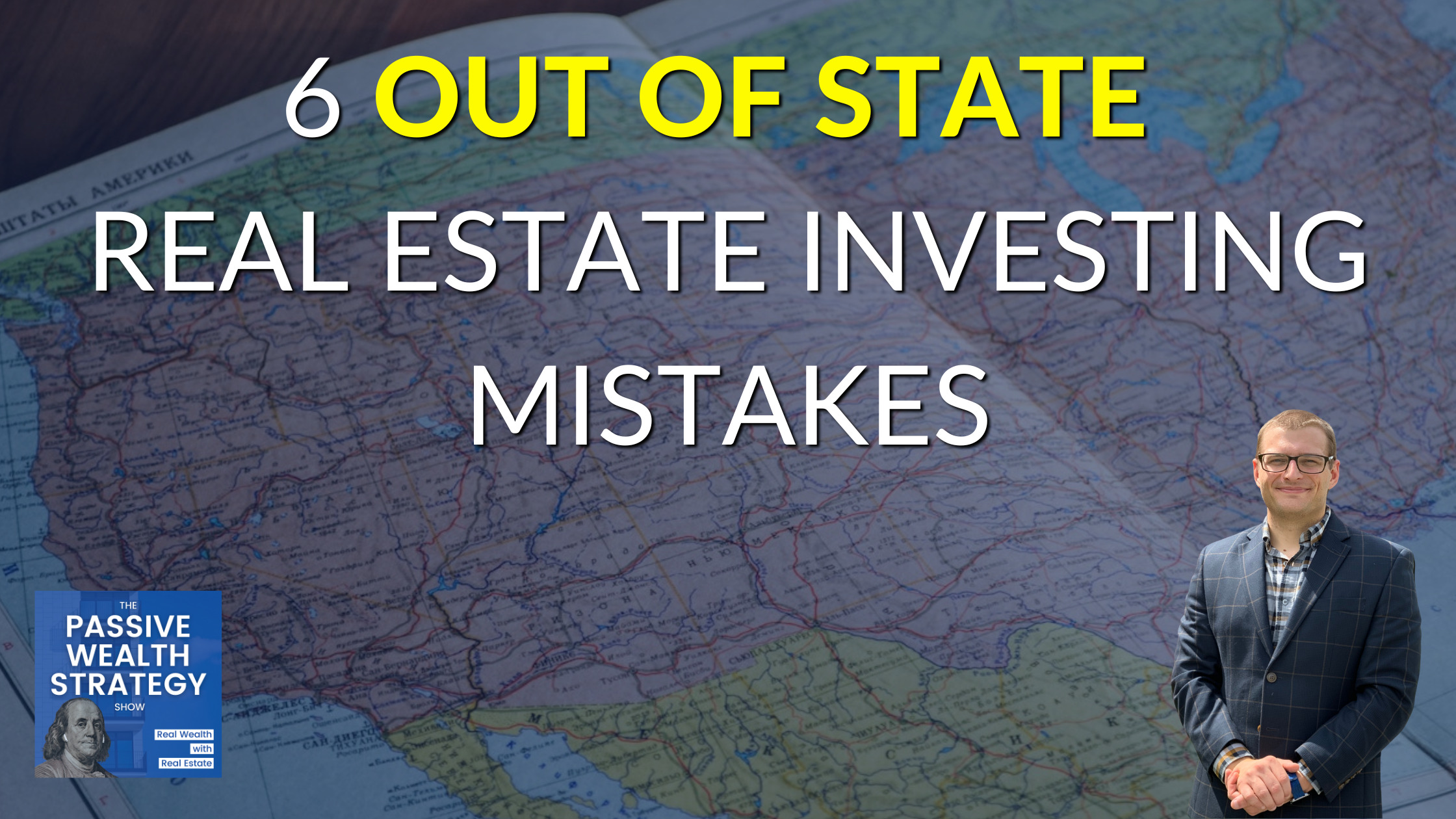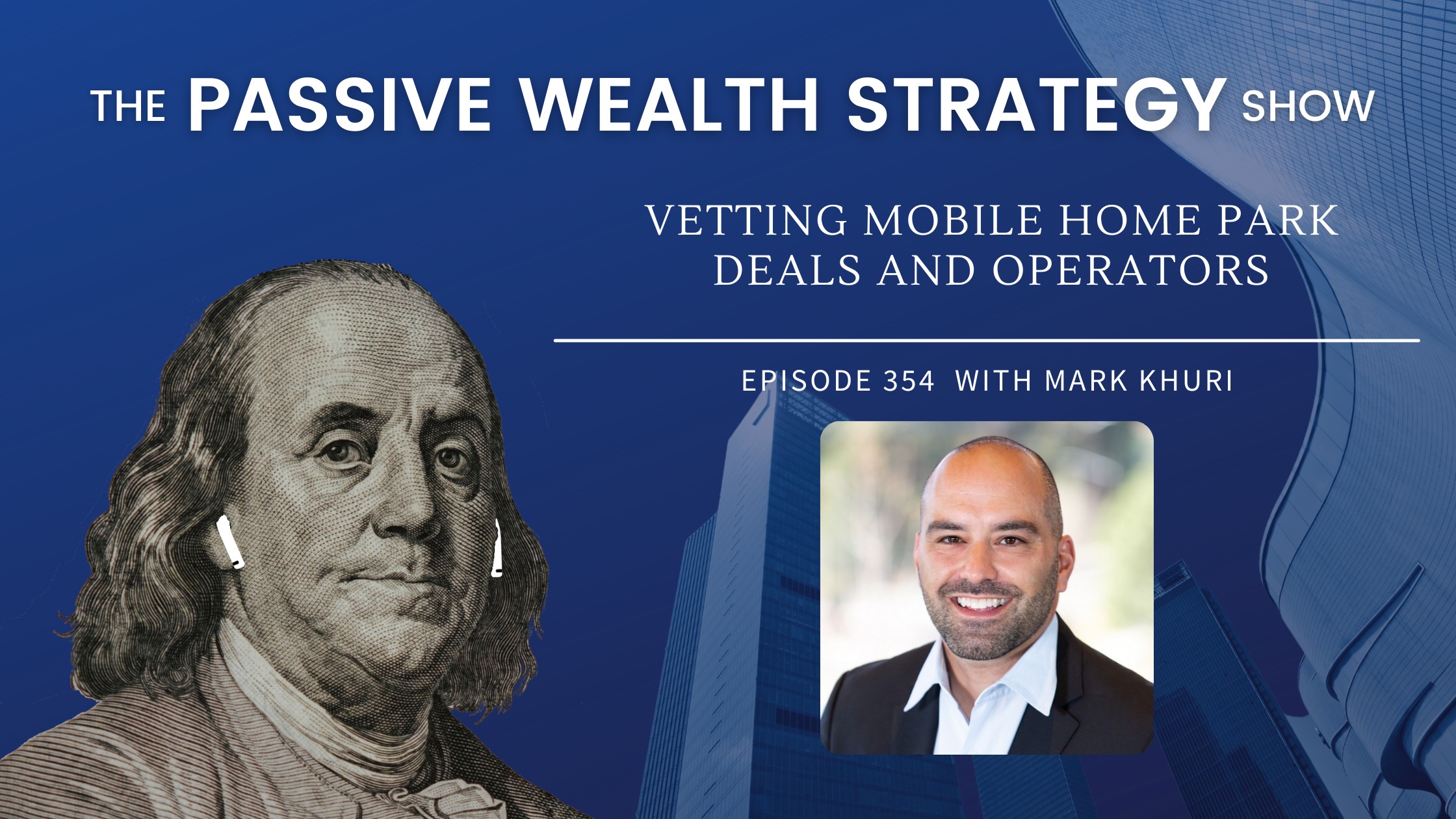
Vetting Mobile Home Park Deals and Operators with Mark Khuri
Mark. Thank you for joining us today.
Thanks for having me, Taylor.
It’s been a great conversation so far, and I think we’re going to have a lot of great knowledge for our listeners today. For those out there who don’t know about you and your background, can you tell us a bit about SMK yourself and what you do?
Sure. Yeah. I’m a financial analyst by trade. I used to work in corporate America doing a lot of spreadsheets analysis, you know, really fun stuff. And, while I love the numbers, it transitioned well into real estate investing. And so I started investing in real estate about 16, 17 years ago. And, just evolved over the years and doing it full-time for 12 years.
And essentially what we do is we, find great opportunities with great people. We create partnerships, syndications, and we invest in multiple asset classes that we think, have some of the best potentials for cash flow and growth. And we allow our investor group to invest with us as well. So that’s.
Short and quick one for you. I’m sure there are some questions there. Oh, there are so many questions there.
And for the folks out there, could you give us a rundown of the asset class types that, that you invest in? Just so we, you know, folks have kind of a picture, of what you do.
Sure. I mean, we’ve invested probably within the real estate industry and maybe over a dozen asset classes, Taylor, over the years, we’ve, really fine, tuned it and targeted, what I’d call kind of our main free bread and butter today on that we love to invest in the first one is mobile home parks.
The second one is a self-storage and the third is workforce apartments in growth markets.
Great. And in the timeframe that you’ve been a real estate investor, you know, from 16 years ago. And I think you said 12 years ago, going full time, obviously the market has changed significantly. You, you witnessed, you know, the original run-up and the great recession firsthand, and then the changes over the last market cycle.
, and I’d love to dig into some of those changes because you’ve been there, you know, right along with them with some asset classes, gaining a lot of popularity and some getting less popular. So let’s dive through it and talk about how that’s changed.
Yeah, it’s, it’s very applicable. Taylor, great question.
We, when we started, we being my family and me, and myself, of course, in our investor group started out heavily focused in the earlier years, call it around the great recession time, post-recession, 2009, 10, really investing, focusing heavily. And single-family, small multifamily, distressed, you know, boarded up stuff that you buy all cash from the bank, do a lot of heavy lifting, turn them around, sell them or, or refi out and hold for rental income and evolved over the years.
Started by investing in, more diversification into other asset classes that we felt had a very good likelihood of continuing to perform. I mean, if you could imagine back in 2010, the world was falling apart and there was only a few asset classes at the time that we found a lot of conviction around their ability to.
You know, keep doing well and performing. And those were the ones that we continue to invest in today. And so we’ve evolved and we’ve grown to, to, to the asset classes I noted, Well, we kind of stopped investing in single-family, small multi-family about three, four years ago. Now. , there was just a lot of reasoning for that, but a few of the reasons for us was, a historically single family has been correlated to the overall market.
And so during economic downturns, recessions, they tend to follow the market, whereas commercial real estate, you know, general principle valuation is based on income. And so a little bit less volatile during the downturn. So we really started preparing for a recession. , we created a recession-resistant fund in 2018 and closed it in 2019.
We combined our three asset classes to get. We invested in over 50 properties, across 13 states and more than 12,000 units of housing, mobile homes, and storage. And so today, we still focus on what we think are the best asset classes for a risk-adjusted return. , but I will share with you, of course, as we all know that cap rates have been declining for 10, 11 years now, and mobile home parks, you know, used to have a going-in cap rate of eight, 10 per.
And that was somewhat normal and sure enough, that asset class has seen a significant cap rate compression over the years today. I mean, depending on the market and quality of the park, you might see going in cap rates, in the high to low 3% range, even lower than apartments. And so. You know, what that does for us is it just increases risks, right?
Because now you’re paying a lot more, and you just better know what you’re doing when it comes to operating the asset extremely efficiently, and there better be a value add the business plan. Otherwise, we’re not interested in investing in it, right. We’re not going to buy it and sit on it and just hope that the market’s going to keep going where it is.
We like to focus on manual appreciation, growing NOI by doing a certain specific set of things, and do that over and overnice eye manual appreciation.
I don’t know if I’ve ever heard that term used. I always think of it as forced appreciation, but I would assume you’re you mean the same?
Correct. Yeah. We’re, we’re, we’re making decisions and taking action manually forced synergetic there to grow value.
I like that manually though. I might, I might, I might shift and start saying manual appreciation. I don’t know. We’ll see. Yeah. I always liked driving a manual transmission car, but I haven’t owned one for years.
So we have seen. , do asset classes, in particular, get a lot more popular, a lot more attention. self-storage and mobile home parks in particular, when we talk about self-storage right now, and I think one of my big concerns in that area is the popularity has meant. A lot new, a lot more new entrance coming into the business who don’t know that asset class and don’t know the finer points of what it takes to run a mobile home park, what can go wrong.
And especially with folks buying it at two and three caps, I mean, if they don’t know what they’re doing, they don’t have that experience. That doesn’t seem like the best move to me.
Sure. Yeah. It’s a high risk, right? We’re at, asset pricing today is at all-time highs. Taylor, it’s been going up three years.
And so we’ve been saying that for years. How much more can it go? we don’t know. , but we do see that there are a lot of good investments out there that can provide great returns if they’re positioned correctly. , if they’re bought correctly and if they’re managed correctly and operated correctly.
And so, yeah, there’s a lot of new entrants to those two asset classes. , We tend to focus on operating partners that have a stellar track record, are specialists in one thing, and do it much better than us. And so, usually, they have an A of 500 million or more, and they’ve got a lot of competitive advantages that we, would want to partner with them on and take advantage of.
And so that’s kind of how we look at it. Some of the newer entries into the. Spaces noted. , you know, may do very well, but in my view, there’s just a little bit higher risk with lack of experience. And so we try and, really, you know, look for operators that are, seasoned to settle east and have a pedigree that, you know, we’d want to stand side by side with them.
I like that. I think that’s smart and. Just to back up a little bit. I really appreciate that you say recession, recession, resistant assets, and not recession-proof because that’s ridiculous. Absolutely nothing is recession-proof. Anything can happen. Right. And we need to always be aware of that. So when it comes to mobile home park investing, you’re focusing on experienced sponsors with, I think you said over $500 million in assets, under management, but from a deal perspective as well.
What are some, we’ll say red flags or say maybe a green flag? You see something that, Hey, that’s a good sign or something that, Hey, that’s a bad sign that, that you like or this.
Yeah. I mean, it’s different for each asset class to tailor what we look for and try to avoid. , and we could talk about that for a while.
I think maybe what I’ll do is I’ll share with you some thoughts on mobile home parks since we’re chatting about them. So a few things that we, look for as we try and find parks that are. Heavily owned or the homes are heavily owned by the residents, not by us. Right. So we’re, don’t want to necessarily own the homes.
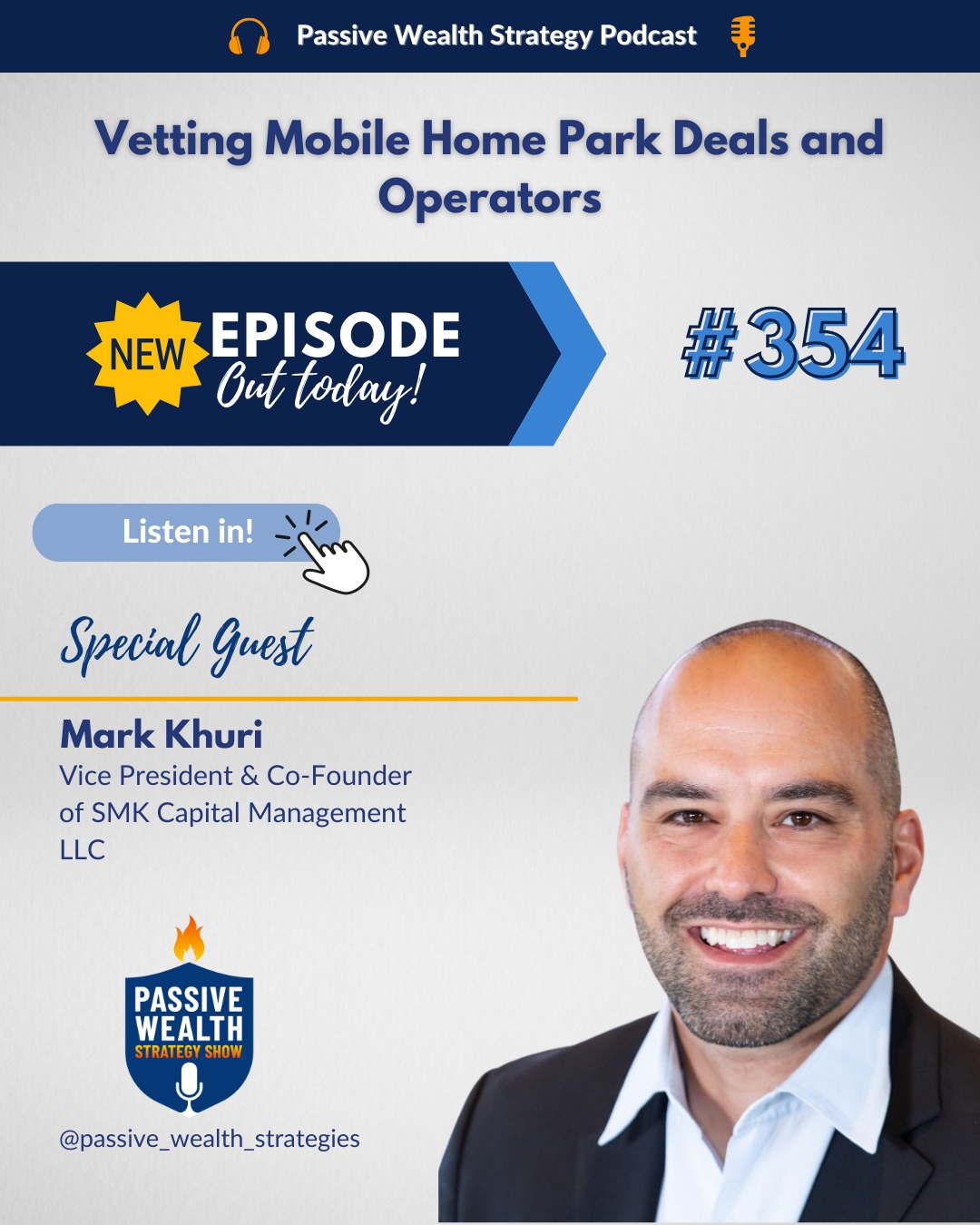
Vetting Mobile Home Park Deals and Operators with Mark Khuri
We like our residents to own the homes. They’re responsible for the maintenance upkeep of that. And there, they’re homeowners and so their longevity and, they would just stay there at the park for a long time. , and it reduces our operating expenses because we’re not responsible for maintenance and repairs.
, we, they just paid a lot of rent. And so that’s one portion of mobile home parks that we try and focus on. It’s getting harder and harder to find deals. Taylor, where all the residents own the homes, they tend to be. Parks are trading at very low cap rates because they have lower risks. Right. And so, we also look for mobile home parks where occupancy, maybe lower than where we think we can take it.
Right? So there’s an opportunity to improve occupancy and that can come in a form of a few different ways, but we try and find, you know, parks that have maybe, 10% of the lots are. Or more, not too much. If you get too heavy in value, add it might become a zero cash flow investment and we try and have both cash flow and growth.
And so we want to have a play, a business plan upfront tailor. We can grow the value and we have a very strong belief, that it’s going to be successful. And so if you’ve got a park that has, you know, 10, 15% of the lots vacant and we can bring in new homes over the first few years, And affordable housing is deficient in the marketplace.
You have a very good likelihood of growing net operating income in that park. And so that’s another area that we look for. , we try and stay out of war zones where there’s a lot of crime. And we tend to focus on parks that, really provide an affordable housing solution. Right. As we talked about previously, we try and look at the gap between the cost of homeownership for a stick-built house and the cost of living in a mobile home park.
And we want to have a nice, nice spread there, right? Usually, about 30, 40%, sometimes higher 50%, where you’re going to have a. Potentially a waiting list for the mobile home park homes that you’re going to bring in. And so, I’ll pause. See what questions you have. And those are some of the things we look for in mobile homes that we try and focus on and also avoid.
I think that the point about the costs, we’ve talked about this before we recording the cost of a single-family home compared to the cost of living in a mobile home park. I mean, I hadn’t even thought of that before you pointed that out. Oh, yeah, of course. You want to look at that, right? That makes your mobile home, comparatively more appealing, and then the housing affordability aspect is huge.
And that’s not a problem that frankly can be solved within any number of years if it exists. I mean, it’s going to take a long time to bring any new housing stock on board, no matter where you are now when it comes to. Filling in vacant pads in a mobile home park. When I had dug into mobile home parks and looked at putting some deals together myself there, one of the big problems that I ran into was zoning and, and lot design that was not really compatible with the way and the size that mobile homes are built today.
And that the setbacks were, you know, too large and the spot you could put a mobile home, it was just not realistic. That is feasible for mobile homes. You’d be able to actually find now that’s kind of into the weeds of due diligence, but you know, how much should sponsors be digging into those things as they, you know, are, are looking at deals, getting out of contract.
What are your thoughts about that? I mean, it’s kind of a detailed question, but you know that that’s something you wanna figure out on the front end.
Yeah, you’re going to want to know that Taylor is actually going to be able to bring mobile homes in. And then if there is a restriction like you noted, maybe it’s not a new home, right.
Maybe you have to only be able to source older homes that are used maybe 1960 seventies, eighties vintage homes, which you can find they’re just harder to find because they’re few and far between. And so if you know that ahead of time and you have a strategy to get those homes and you know that that’s all you’re going to put in.
I would just say that you know, from an investor standpoint, you’re going to want to look at that deal and not place as much emphasis on the projected returns from the value add a component of bringing those homes in because that’s a higher risk value add proposition. And so if you like the deal, assuming that they don’t bring any homes in, and it still makes financial sense and hits your return metrics, then you might be fine.
You know, in my view, just taking a conservative approach and saying, Hey, look, they may not be able to actually do this. Let’s still proceed because even if they don’t do it, I still like this opportunity.
Okay. Okay. Now you, I think you said before, you’re in, you’re invested in 13 states. If I remember, right.
I remember that, in that one fund, our recession-resistant fund has assets across 13 states. Yeah. But as a company and personal investing, I mean, we’ve got, we haven’t calculated Taylor, but probably more like 20, 25. Hmm.
Okay. Awesome. And one of the things that we’ve seen as is probably this is a fairly detailed question, but that’s one of the things that’s happened over the last year, year or so is that insurance rates have really gone up in a lot of areas, particularly the Sunbelt’s been hit pretty hard, but, but they’re kind of going up across the board.
But I didn’t, I haven’t explored that topic, for mobile homes and mobile home parks. And there’s, there’s that always that, you know, kind of, I guess, the stereotype of a, you know, tornado going through a mobile home park and in the Midwest and you know, how are investors dealing with that from a mobile home parks perspective has that, you know, insurance rates gone up comparatively and what have you.
Yeah. I mean, there’s always that stigma and that fear of, you know, a hurricane coming in and blowing in the Parkway. Right. It’s gone overnight. , and you know, I had that. Many years ago when I first started analyzing the asset classes and investment options. , I will say that it’s, it doesn’t happen that often.
Number one, Number two. , the quality of the, I should say the guidelines, the requirements, with bracing and belting of the home too, to the cinder block foundation, that’s under it. , although it’s mobile, they’re there. They’re not that easy to move tailor, right? Some people think they’re just sitting on the ground when they’re not, and there’s a little bit more security there.
, and so that helps of course, where today the new mobile homes that come in, they can withstand a lot of wind a lot more than most people think. I don’t know the exact numbers, but, were the requirements again, have gone up for safety and security. Now with that on the insurance side? Yeah. Properly being properly insured is mandatory for all of our investments, not just mobile homes.
We’ve had fires at properties that have, had almost a total loss. , that’s happened at a duplex, for example, tenants had to climb up the window and it’s scary stuff. Right. And so you have to make sure that you’re protected. , insurance costs have gone up. We’ve seen that lately. , we just budget that into our performance.
We expect that they’re going to continue to go up, and that’s kind of the nature of today’s market. And so you’re going to want to look at and deals and see what’s the projected. Increase on these kinds of expenses in year one to year two, et cetera, et cetera, going forward. Are they being conservative?
Are they assing that this is we’re going to stay flat and not go up? You know, really look at that line item on the performance and determine, how that assumption is being captured. , and now as far as how, you know, what type of protection and this and that, you know, for most of our asset classes, we look for loss of rents.
So if there is a devastation of fire, like I noted the insurance company will cover the lost income from the residents or the customers that. , or not going to continue to, to pay for a space that they’re not using. , and while the insurance claim is going on, right, you can get that, that cost recouped, or that loss of income recouped.
We also, You know, one thing we’ve done in the past is we’ve hired an insurance loss, professional to come in and act on our behalf and sign over the power of attorney to them. And then they work with the insurance company for you. And, see how to say this properly, but insurance companies don’t always have your best interest in mind.
I’ll just leave it at that. So hiring a third party, a private claims adjuster, has been something we’ve done an extra couple of times and David’s in essence, fraught with the insurance company to get a higher reimbursement cost for the damages done. And, that’s one strategy that has been very successful.
Is that more often than not that that works out personally? I haven’t, I haven’t gone that route myself hired one, but, that works frequently.
It depends on the, on the. , the devastation of mountains. How much loss are we talking about? If it’s a smaller claim, maybe a smaller apartment building, it may not be worth it, but if you’ve got to the tune of hundreds of thousands or millions of dollars in damage, then, I believe it’s in your best interest.
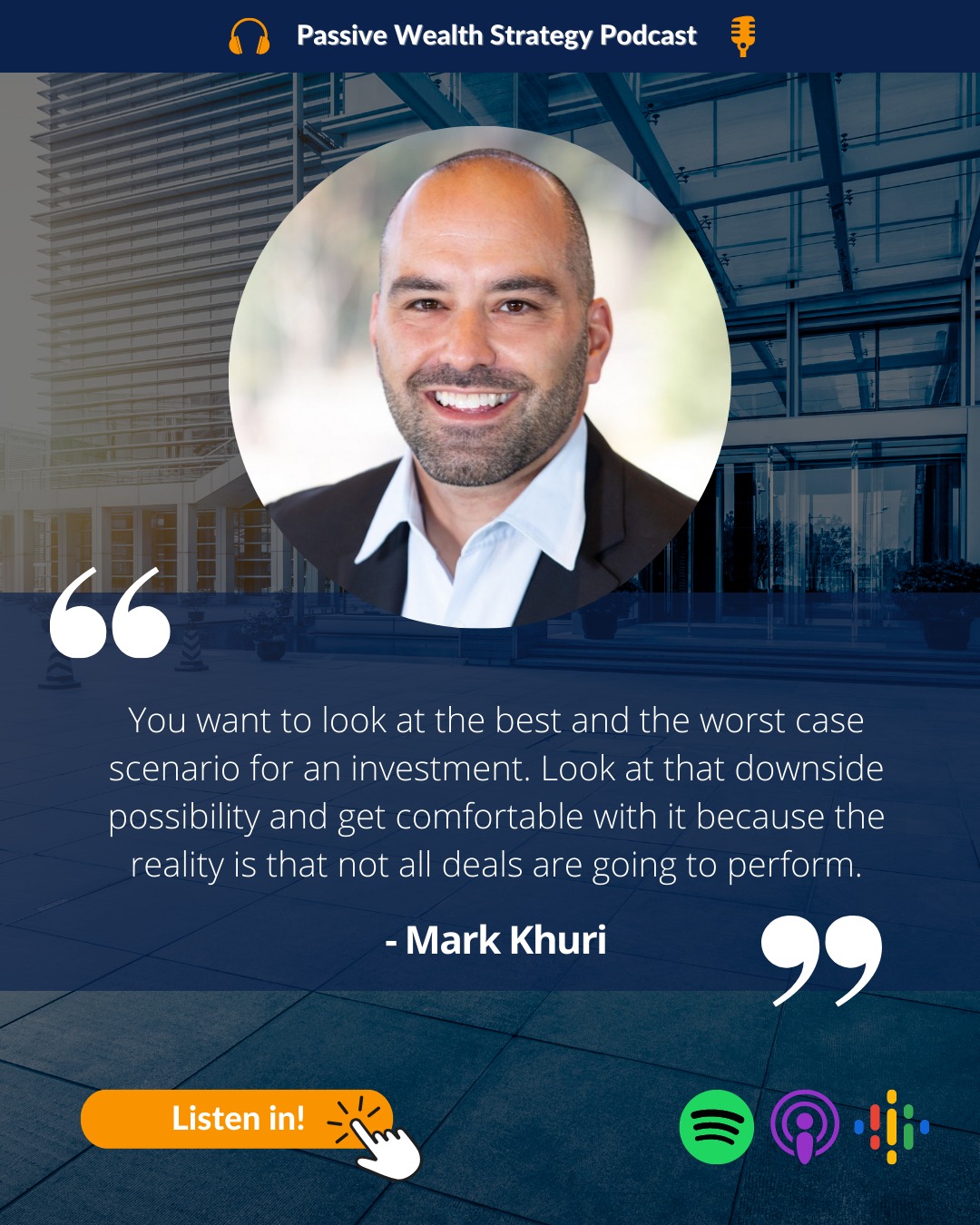
You want to look at the best and the worst case scenario for an investment. Look at that downside possibility and get comfortable with it because the reality is that not all deals are going to perform.
Mark Khuri Tweet
If, unless you, again, you might have somebody on the team or somebody that does. Very well, that’s going to come up with their own quote for a line item by line item for the cost to action and cure the damage, and then show that that insurance company quote, is missing things. If you can actually be that sophisticated, because that’s essentially what they do then, you know, have at it.
But, we find it to be very. Aligned. And a lot of times, Taylor, not always, but some of these folks will, technically only get paid once the claim is paid out. And so it’s really performance-based. If you can find that structure, it’s, it’s a win-win. Okay, cool.
So we’ve talked a bit. Sponsors and looking at them or, you know, people that are actually doing the deals, making sure that they have experience in all of that.
, I’d like to kind of, shift the magnifying glass if you will. And, and we’re not going to talk about any, you know, specific offerings or what have you, but if someone out there. Is considering investing with someone like you who’s, you know, going out and finding these sponsors, what would you say are some good questions to ask mark if they get on a call with a mark or, or someone like a mark?
Yeah. You know, if it feels specific or, even if it’s not, you always want to start out with, you know, Y Y., every deal has a story, right? Should they almost always do? What’s so unique about this one, cause there are opportunities out there and you go on Google and just find investments in drowning.
Right. And so how do you pick the right ones and why is this a good opportunity? And does it align with my interests and my goals? Right. So income versus. It’s a good way to start. , how much of the total return is coming from income? How much of the total return is coming from growth? Look at that percentage, right?
And see if you’re an income-focused investor. You may not want to be in a deal where the total return, you know, 75% of it’s coming from. And you might want to look for something a little bit more balanced, maybe 50, 50 income and growth that also helps reduce risk. And so make sure that the deal is aligned with what you’re trying to do and achieve.
And then as far as people go, you know, you got to have some established sense of trust, in being a passive investor. And if you don’t, don’t invest. Right. And so how do you create that? it takes time. You gotta ask a lot of questions. You have to really feel that. Partner with folks that have your best interest in mind.
Number one, you have to feel that they’re going to be very, has a very high likelihood of meeting or beating the projected returns right now. You want to kind of decipher between deals that, you know, as we say, all the stars have to align just to get to the projected return. Versus very more conservative underwriting or have some assumptions in there that may not take into account.
Some of the growth plays that you’re actually going to do and have a lot of meat left on the bone. So again, you want to be able to decipher a deal, the ability to actually meet to beat the return versus just barely get there. , some specific questions you always want to talk about track, record, and performance
still. , making sure that the deals that you’re looking at are something they’ve done before. It’s not the first time, right? Show show me how you’ve done this before and why this one will be successful. And again, like boring and repeat repetitive. And so that’s a big part for us. Hey, we’ve done this 20 times.
Here’s why we think we could do it again. That kind of thing. , those are some, some points I think you’d want to look for then references. Ask call get as many as you can find some organically, you know, go on LinkedIn, find the people, see who they’re connected to that, you know, and then reach out to them without anybody knowing and see if there is positive or potential feedback, they can give you one way or another.
So really sleuthing. , in your mind, a lot of the questions are pretty similar. If, if a passive investor is speaking with someone who raises money, he places capital in versus speaking directly with the PR, the operator. If you will.
Yeah. Yeah. It’s kind of a team effort. Right? And so, one thing we do is we vet people, it takes a long time and a lot of times we vet it with our own money where we’ll write a check and invest before we bring an operating partner, offering to our investor group.
And so, find out how much vetting has been done. You know, I, again, I’m an analyst by trade and so I ask a ton of questions. And so I think that’s a benefit for our investor group where. We feel that we’ve probably checked off a lot of boxes before we’ll bring an opportunity to the table. And if investors are looking at other areas and they’re talking directly to a sponsor, they’re gonna wanna do the same thing.
And sometimes, you know, vetting, vetting people tailored, takes a lot more time and. And it’s harder than vetting a deal. , but the people are more important than the deal. So you have to kind of, make sure that you’re, you’re paying enough attention to what really matters, right? Because you can, you can look at overly zealous projections all day long of pie in the sky type numbers and get excited about an opportunity.
But if you don’t have the right people, it doesn’t matter what those projections are.
I love that. And we’re going to stick a pin in it and take a quick break for our sponsor. All right, mark. I’ve got three questions. I ask every guest on the show. Are you ready? Let’s do it. Great. First one. What is the best investment you ever made other than in your education?
Yeah, I, the most recent one comes to mind and I’ll share that with you just because it’s relevant. Okay. And I’ll say this in 2020 on the onset of the pandemic, we stopped investing entirely, for a period of almost, two quarters. , we watched, we waited, we analyzed, we talked to tons of folks in the industry.
We looked at our own portfolio performance. We’re trying to find out, is there going to be distress, right? Are tenants going to stay in pay or are they moving out? And we have a high vacancy. And by the end of summer 2020, we found that there was actually, a high occupancy rate. Staying consistent collections were still very strong, typically over 90% at our assets.
And, we found there’s a lot of demand for, what we’d call higher-quality interior renovated apartments specifically versus, maybe some of the older stuff that was dated. Spending more time at home and they wanted their home to be nice. Right. We decided in, about Q3 2020 to make our first investment, into an apartment community in Phoenix.
, it was with a very reputable operator there that, has a stellar track record and checked all of our boxes. And so, and they were referred to us from another investor that had been doing quite well with them too. So we’ve invested with them. The business plan was to renovate. , I think it was about 280 units Taylor gave.
Over the period of three years and then to sell the asset, they renovated 25% of the property. , after the first year we sold it in October of 21, and, our investors earned over 92% average annual return. And so it was a real home run. And it’s relevant to, to, to kind of what’s been going on today, if an essence that.
That performance came from two things. One, our operating partners executed tremendously well on the business plan, they grew the net operating income from 2 million at the start to 2.8 million by the end of one year. And we had projected the exit cap rate to be about 150 basis points higher than the going-in cap rate.
And what happened was the cap rate compressed as well. And so you got the benefit of. You know, stellar execution and market tailwinds, you know, that you kind of have to have both hits those kinds of numbers, but that’s essential, a recent one that nice. w we go to the other side of that coin, the worst investment. What is the worst investment you ever made?
Yeah, I say maybe it was just a personal investment. I made it into, an oil mining field in Texas. , just outside of my box and my comfort zone.
Didn’t spend enough time analyzing it myself to truly understand it. It was a little bit more of a speculative play. The cost or price per barrel of oil was quite low at the lowest. And we just passed, Hey, it’s only going to get better from here, but there were a lot of operational hurdles, and that investment it’s still active, but it’s just not performing.
And, and so we’ll see where it goes. I think, you know, right now maybe we’ll sell it this year and break even, or have a slightly positive return, but just speculative and, and outside of my comfort zone, but it was just a small, personal investment, I think. I learned from it as, you know, do more research and stick to what you know, and do well.
Yeah. Yeah.
I don’t hear the best things about those oil field investments and haven’t done one myself.
Yeah. I won’t comment.
My favorite question here at the end of the show is what is the most important lesson you’ve learned in business and industry?
Yeah, I would say, you know, I’ve stressed throughout our talk together about people, and aligning yourself with the right people.
But we hear that a lot. It’s a bit cliche, although it is critical. , I think another point that I would mention is. You want to look at the best-case scenario and the worst-case scenario for an investment, and really look at that downside possibility and get comfortable with it because there’s a reality here is that not all deals are going to perform.
The market is going to change. Things aren’t going to play out exactly as the performer shows. And so don’t just look at the projected returns really focus on sensitivity and downside. You know, what happens if occupancy goes down by 20% or if rents are flat or if rents go down. Nobody projects, friends going down, Taylor.
Right. And so look at that and see what the end result might be for your rate of return and get comfortable with the downside as well as the upside.
Perfect answer from a financial analyst in particular. I love that. And a lot of great points there. Mark. Thank you for joining us today. Such great lessons from this conversation.
If folks want to reach out if they want to get in touch with you or learn more, or, you know, whatever, get in touch, where can they track you down?
Sure. Our company name is S M K capital management. , we have a website, of course, SMK cap.com and you can also email [email protected].
Awesome. Well, thanks once again for joining us today to everybody out there.
Thank you for tuning in. If you’re enjoying the show, please leave us a rating and review on apple podcasts. I appreciate that so much. You guys help other people learn about the show because that helps us rank. In the apple podcast ecosystem. And I’m always honest with you guys. I say this every show and I mean it, every time that gives me a nice little warm and fuzzy feeling.
Cause I get to see that you’re engaging with the content and you’re escaping the wall street casino along with us. If you know anyone who could use a little bit more passive wealth in their lives, please share the show with them and bring them into the tribe. I hope you have a great rest of your day and we’ll talk to you on the next one.
Bye-bye.

Vetting Mobile Home Park Deals and Operators
About our Guest
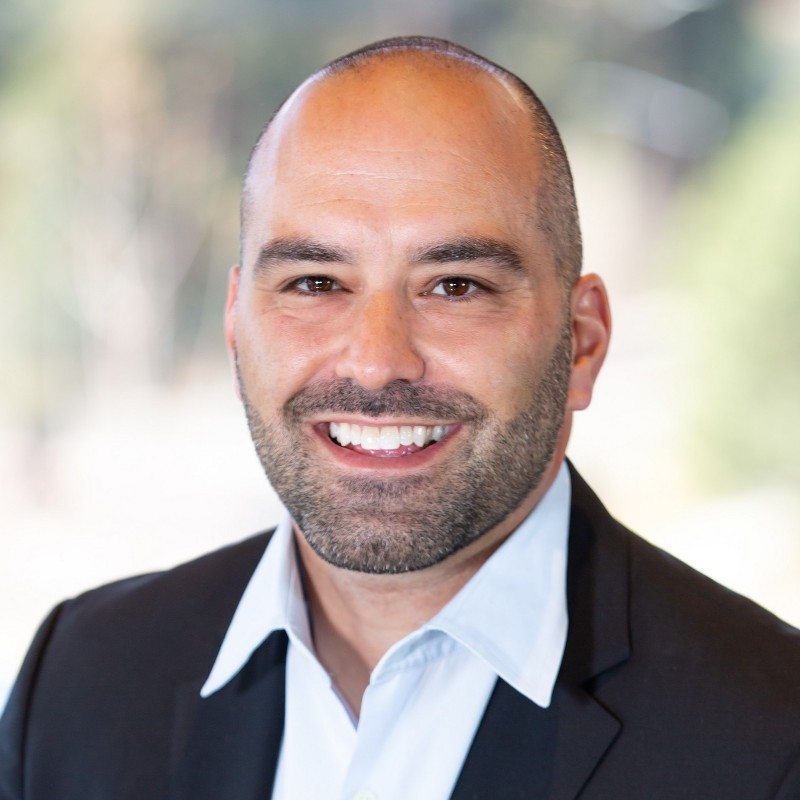
Mark Khuri
Mr. Khuri brings over 15 years of real estate investing experience to the organization. His career started in 2005 when he began investing in residential real estate in California and Florida. Throughout his career Mark has been involved in sourcing, underwriting, acquiring, raising capital, rehabilitating, managing and selling both residential and commercial investments throughout multiple markets in the US.
Mr. Khuri has analyzed hundreds of investment opportunities and has successfully bought, renovated, sold and invested in over 120 properties with a combined value over $1 billion and created and managed over 45 real estate partnerships with investors.
Over the last decade, Mr. Khuri and affiliates of SMK have invested in over 45 commercial real estate opportunities across numerous asset classes including mobile home parks, self-storage facilities, multi-family communities, retail shopping centers, oil wells, student housing, vacant land, short-term debt and ATM’s.
Prior to founding SMK Capital Management, Mr. Khuri was the Vice President of Sales & Operations with a private retail distribution firm and Mr. Khuri worked as a financial analyst with a fortune 500 Company performing budgeting, planning and internal audit roles. Mr. Khuri holds a B.S. in Finance from Bentley University in Waltham, MA is a CA licensed RE Broker and teaches Real Estate Investing Principals and Best Practices at Central Oregon Community College. In his spare time Mr. Khuri enjoys spending time outdoors with his wife and 2 children.
Episode Show Notes
Mark Khuri brings over 15 years of real estate investing experience to the organization. His career started in 2005 when he began investing in residential real estate in California and Florida. Throughout his career Mark has been involved in sourcing, underwriting, acquiring, raising capital, rehabilitating, managing and selling both residential and commercial investments throughout multiple markets in the US. Mark has analyzed hundreds of investment opportunities and has successfully bought, renovated, sold and invested in over 120 properties with a combined value over $1 billion and created and managed over 45 real estate partnerships with investors.
Over the last decade, Mr. Khuri and affiliates of SMK have invested in over 45 commercial real estate opportunities across numerous asset classes including mobile home parks, self-storage facilities, multi-family communities, retail shopping centers, oil wells, student housing, vacant land, short-term debt and ATM’s.
[00:01 – 03:35] Opening Segment
- Get to know Mark Khuri
- Finding great opportunities with great people
[03:36 – 13:09] Vetting Mobile Home Park Deals and Operators
- Mark and His Team’s Top 3 Assets
- Changes in the market: What gained and lost popularity since The Great Recession?
- Red and green flags to keep an eye on with mobile home parks
[13:10 – 24:48]
- Investing in over 25 states and dealing with insurance rates
- Why you should hire a third-party private claims adjuster
- Questions to Ask Mark
- Vetting Mobile Home Parks versus Vetting People
[24:49 – 34:31] Closing Segment
- Quick break for our sponsors
- Groundfloor offers short-term, high-yield real estate debt investments to the general public. Check www.passivewealthstrategy.com/groundfloor/ to get started.
- What is the best investment you’ve ever made other than your education?
- Apartment Community in Phoenix in 2020
- Mark’s worst investment
- Oil mining shield in Texas
- What is the most important lesson that you’ve learned in business and investing?
- “You want to look at the best-case scenario, and the worst-case scenario for an investment.”
- Connect with my guest. See the links below.
Tweetable Quotes:
“You got to have some established sense of trust in being a passive investor. If you don’t invest, how do you create that? It takes time and you got to ask a lot of questions.” – Mark Khuri
“Sometimes, vetting people takes a lot more time and effort, and it’s harder than getting a deal.” – Mark Khuri
————
Connect with Mark Khuri through [email protected] and LinkedIn. Visit their website https://smkcap.com/.
Invest passively in multiple commercial real estate assets such as apartments, self storage, medical facilities, hotels and more through https://www.passivewealthstrategy.com/crowdstreet/
Participate directly in real estate investment loans on a fractional basis. Go to www.passivewealthstrategy.com/groundfloor/ and get ready to invest on your own terms.
Join our Passive Investor Club for access to passive commercial real estate investment opportunities.
LEAVE A REVIEW + help someone who wants to explode their business growth by sharing this episode or click here to listen to our previous episodes







